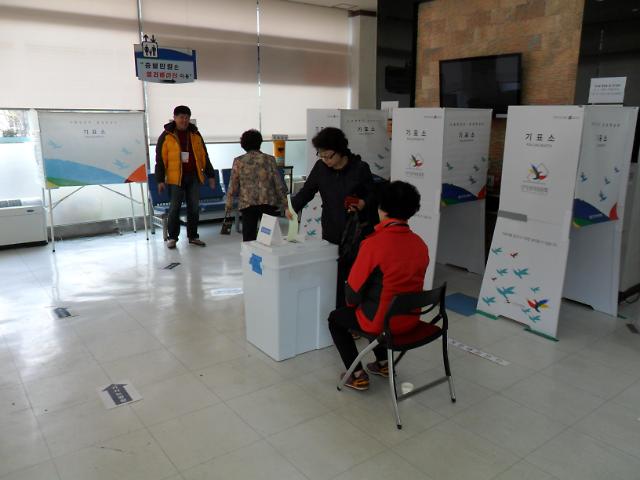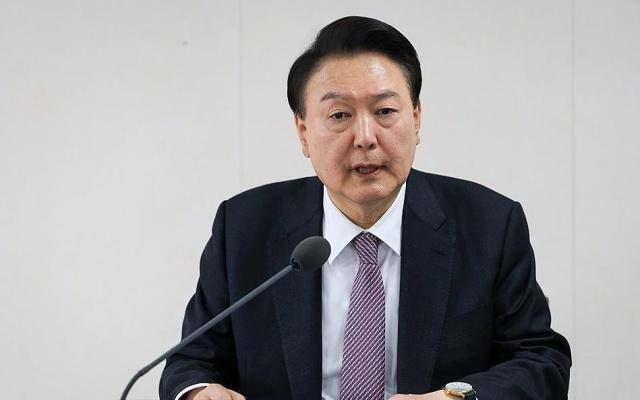
[Aju News DB]
Field sketch of polling place prepared at a community service center in Myunmok-3.8-dong, Jungrang-gu, Seoul [Park Sae-jin's YouTube channel]
South Koreans cast ballots Wednesday for a parliamentary election seen as a vote of confidence on the economic policies of the conservative ruling Saenuri party and President Park Geun-hye, who has less than two years left of her five-year term.
At the voting for the 300-seat unicameral National Assembly, 253 seats will be directly elected. The remainder will be filled with "proportional representation" seats. Each voter cast two ballots: one for a candidate and the other for a party.
Both ruling and opposition parties saw the election as a test of gauging public sentiment ahead of South Korea's presidential race in December 2017.
"I am embarrassed to say this. But this is my first time coming to the polls," Kim Kee-Hee, a 37-year-old hairdresser, told Aju News. "I felt there's some changes needed to be made, and there was a candidate in my area who had the same idea as I did."
Namkung Geum-soon, a supermarket owner, said: "Voting is people’s duty and that's what changes the future of the nation. I have a newborn grandson, and I wish him to grow him up in the better future."
A polling booth operator in Seoul said that turnout was relatively low before noon due to rain but a longer queue was formed in the afternoon.
Pollsters have predicted Saenuri would probably win a majority although it may lose some seats to independents in its regional strongholds.
Previously, Saenuri sought to secure a comfortable majority, but it now says the race will be close in South Korea's most populous metropolitan region covering Seoul and adjacent areas where more than 100 seats are up for grabs.
Traditionally, parliamentary elections have been a two-way race between two large parties with strong regional backing. This year's ballot, however, could become a three-way race with the liberal voted split between opposition parties.
Ahn Cheol-soo, 54, split up with Moon Jae-in of the main opposition Minju Party of Korea to found his own group, the People's Party, as the opposition party was criticized for failing to offer in the way of alternatives.
Ahn, a former physician and professor who founded Ahnlab, an antivirus software company, jumped into politics in 2012 as a potential presidential candidate with his urge for the "new politics". But he dropped out of the race and sided with Moon to field a unified candidate only to see Park's victory.
If Moon wins far less than 100 seats, Ahn's party will become a third largest group in parliament with a significant stakeholder. Surveys showed the splinter People's Party may win more than 20 seats with the strong backing of voters in southwestern provinces.
Park, who is more than halfway through her term, also needs at least 180 seats to fast-track her economic packages including an unapproved bill aimed at securing greater labour market flexibility.
The opposition group has allowed Saenuri to enact laws on corporate restructuring, but other crucial economy-related bills were left intact in parliament.
There has been a bitter standoff over how to reform South Korea's labour market. Workers are afraid of losing important protections, arguing the new bill would result in lower wages and little job security.
With the population ageing rapidly, many older Koreans have insufficient savings to retire while young voters are discontent with a record-high jobless rate and widening inequality in income and career prospects.
Many young people are less interested in marriage or having children due to costly housing expenses, unstable employment and high living and wedding costs. The youth jobless rate surged to an all-time high of 12.5 percent in February, as many companies shelved new investments due to sluggish exports and weak demand.
Aju News Lim Chang-won and Park Se-jin



![[OPINION] Election loss weakens Turkeys President Erdoğan](https://image.ajunews.com/content/image/2024/04/11/20240411153203838176.jpg)
![[OPINION] Indonesia Election – Victory for Democracy, with Global Significance](https://image.ajunews.com/content/image/2024/02/22/20240222172338598560.jpg)